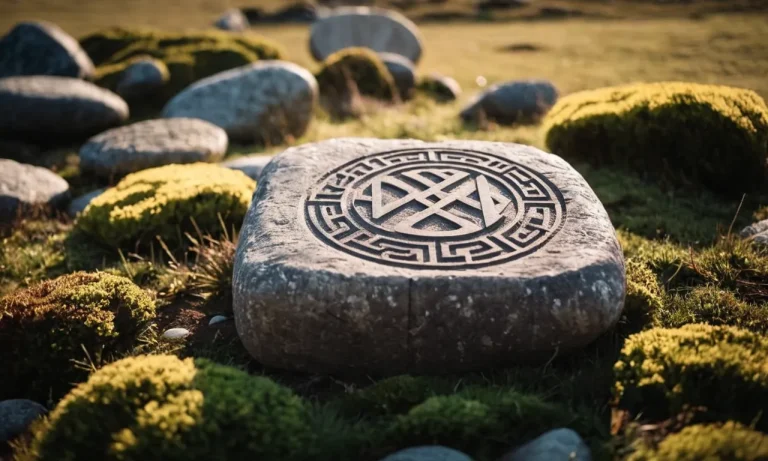What Are The Gates Of Zion In The Bible?
The gates of Zion hold deep symbolic meaning in the Bible. Zion, also known as Jerusalem, is portrayed as the city of God, and its gates represent the passageway to God’s presence and protection.
If you’re short on time, here’s a quick answer to your question: The gates of Zion refer to the gates of the city of Jerusalem, which is often called Zion in the Bible. They represent access to God’s presence and protection for his people.
In this comprehensive article, we will explore the significance of Zion and its gates in the Bible, examine relevant passages, analyze what they represent, and provide context around these important biblical symbols.
The Meaning and Symbolism of Zion in the Bible
Zion is a significant concept in the Bible, representing God’s dwelling place and his relationship with his chosen people. In the Old Testament, Zion refers specifically to a hill in Jerusalem that became the site of the Jewish Temple.
But Zion grew to symbolize the city of Jerusalem itself as the spiritual center of Judaism.
In a theological sense, Zion represents God’s presence and protection of his people. It is seen as the “holy mountain” where God reigns (Psalm 48:2). Zion is called the “city of God” and the place where God dwells among his people (Psalm 9:11, Psalm 132:13-14).
So Zion represents the powerful, loving presence of God in the midst of his people.
Zion as the City of God
The first specific reference to Zion in the Bible is 2 Samuel 5:7, which describes King David capturing the stronghold of Zion from the Jebusites. He then renamed it the City of David and made it his capital.
Eventually, Solomon built the Temple in Jerusalem, fulfilling God’s promise that David’s son would build a “house for God’s Name” (2 Samuel 7:13). From then on, Zion referred most often to the Temple Mount area of Jerusalem.
The prophets later used “Zion” as a name for the entire city of Jerusalem. Isaiah wrote of God’s deliverance for “captive daughter Zion” (Isaiah 52:2). In other words, Zion represented the people of Jerusalem who would be freed from exile.
This develops Zion as a symbol for God’s people and his desired city where they can worship him.
The book of Psalms especially connects Zion with God’s presence and protection (Psalm 46:4-5, 48:8). The psalmists frequently praise God for choosing Zion, adorning it as his dwelling place, and establishing it permanently (Psalm 132:13-14).
So Zion is celebrated as the “city of God” where he meets with his people.
The Gates of Zion as Access to God’s Presence
The gates of a city in ancient Israel represented the access point – where people went in and out. So as God’s chosen city, the gates of Zion symbolize access to his presence there. Psalm 87 celebrates that being “born in Zion” means having access to its blessings from God (verse 5).
In one beautiful passage, the psalmist portrays Zion’s gates as always open to receive the righteous (Psalm 118:19-21). Entering them with thanksgiving leads to the very presence of God. This pledge of access likely brings hope to those barred from worshipping in Jerusalem, assuring them that God hears their prayers too.
Sadly, sin frequently blocked ancient Israel’s access to God’s presence in Zion (Isaiah 1:21, Lamentations 1:4). Their disobedience prevented them from enjoying the blessings of being near him. But ultimately, God promised to restore Zion and once again dwell there among his people (Joel 3:17, Zechariah 8:3).
So the gates of Zion exist as both a literal place in Jerusalem and a symbolic entryway into God’s presence. He zealously guards this access, shutting out those who disobey yet throwing open the gates to welcome the righteous.
And the book of Hebrews presents Jesus as the new high priest and the greater heavenly Zion we can boldly approach (Hebrews 12:22).
Key Biblical References to the Gates of Zion
Psalm 87 – Foundation in the Gates of Zion
Psalm 87 speaks prophetically of the day when the gates of Zion will be filled with people from all nations coming to worship the Lord. Though the nations rage against God’s people, the psalmist declares that those born in Zion are secure because God himself has established Zion’s foundations (Ps 87:1-5).
Even enemies like Egypt and Babylon will one day come there, acknowledging that Zion is God’s city (Ps 87:4). God will register each one as a citizen of Zion when they acknowledge him as Lord (Ps 87:6).
Musicians and singers will gather there as well, celebrating the glorious future of Zion’s gates (Ps 87:7).
Psalm 9 – Rejoicing in the Gates of Zion
Psalm 9 recounts how God will judge the nations with justice and equity from his throne in Zion (Ps 9:4,7-8). Therefore, the psalmist calls all who know God’s name to declare his praises in the gates of Zion (Ps 9:11,14).
They are to rejoice in God’s acts of deliverance there, with the ultimate hope that God will finally end all wars and establish peace on the earth from Zion, judging all people justly (Ps 9:18; 20:7).
Isaiah 62 – The Lord’s Appointed Watchmen on the Gates
Isaiah prophesies a day when Zion’s righteousness will shine brightly for all nations to see, and she will be given a new name by the Lord himself (Isa 62:1-2). Appointed watchmen on Jerusalem’s walls will remind the Lord day and night to fulfill his promises to the city.
These watchmen are told not to keep silent day or night until her righteousness goes forth, salvation comes like a blazing torch, and all nations and kings come and bow before God (Isa 62:6-7,10). Ultimately, the Lord promises to station watchmen on Jerusalem’s gates of Zion who will never cease declaring his praises (Isa 62:6).
The Significance of Gates in Biblical Cities
In ancient times, city gates played an important role in the Bible. They were more than just entrances and exits to a city – they were central gathering places and represented the strength and security of the city. Here are some key things to know about the significance of gates in biblical cities:
Defense and Protection
City gates were designed to be imposing barriers that warded off attackers. Often made of thick wood and metal, the gates were closed and locked at night or in times of danger. Soldiers were stationed at the gates to control access and defend the city if necessary (2 Samuel 18:24).
Having strong gates was a matter of life or death. That’s why broken or burned gates symbolized a city’s vulnerability (Nehemiah 1:3).
Places of Honor
The space just inside the city gates was a common location for public gathering and civic activities. Marketplaces frequently developed there, along with courts of justice (Deuteronomy 16:18). Important announcements were made at the gates (2 Kings 7:1).
The gate area was thus associated with the life and leadership of the city.
Sites of Religion
Because the gates were busy community hubs, they naturally became places where religion was practiced as people came and went. Temples and shrines were often erected near the gates, especially in Jerusalem (2 Kings 23:8).
Worship activities took place there, as did sinister pagan practices that ancient prophets condemned (Jeremiah 7:2).
Places of Honor
The city gate was a place of prestige. Important people would sit there to conduct business or hear grievances (Deuteronomy 25:7). Later, when Solomon built the temple in Jerusalem, its gates were designed as guarded entrances to the sacred space at the heart of Israel’s religion (1 Chronicles 9:18).
So gates could symbolize honor, authority, and spiritual sanctity.
Centers of Community
Beyond defense and government, city gates were useful for basic human connection. People gathered there not just for commerce or official functions but to chat, share news, and make friendships (Genesis 19:1). Youths played near the gates (Zechariah 8:5).
Gates thus represented the social heart of urban life in ancient biblical times.
Whether providing access, security, governance, religion or community, the city gates of the Bible were clearly vital, bustling centers of urban activity. Paying attention to gates in biblical accounts helps us grasp the dynamics of ancient city life.
The Gates of Zion as Representing Salvation
The gates of Zion hold deep symbolic meaning in the Bible. Zion represents the city of God, and its gates represent the path to salvation. Passing through the gates of Zion signifies being welcomed into God’s presence and the community of believers.
Let’s explore the biblical significance of Zion’s gates.
The Gates as Access to God’s Presence
In the Old Testament, the gates of the city of Zion were where the elders would gather to deliberate issues and mete out justice (Isaiah 1:26). Entering the gates meant coming before their authority. More importantly, Zion was considered the earthly dwelling place of God, so entering its gates allowed access into God’s presence.
King David echoes this idea in Psalm 118 when he exclaims, “Open to me the gates of righteousness; I will enter through them, I will give thanks to the LORD” (v.19). For David, the gates represent coming before the Lord in worship and thanksgiving.
The Gates as Salvation for the Exiles
During the Babylonian exile, the prophets Isaiah and Ezekiel delivered messages of hope that God would restore Zion and regather His people. Part of this restoration included the repairing of Zion’s gates through which God’s people could return.
Isaiah prophesies, “Your gates will always stand open, they will never be shut, day or night, so that people may bring you the wealth of the nations” (Isaiah 60:11). Similarly, Ezekiel envisions a restored temple city with gates facing all four directions for the tribes to enter through (Ezekiel 48:30-34).
For the exiles, Zion’s open gates represent God welcoming His people back to dwell with Him again. They embody the joy of salvation after years of judgment.
The Gates as the Entryway to Eternal Life
The New Testament authors pick up these Old Testament themes. In Hebrews, we learn that we have not come to a physical Mount Zion but to the heavenly Jerusalem where God resides (Hebrews 12:22). And Revelation describes the holy city of God, the New Jerusalem, which has twelve gates representing the twelve tribes of Israel (Revelation 21:10-13).
For believers in Jesus, these gates represent the passageway to our eternal home. Jesus declared Himself “the gate” through which we find salvation (John 10:9). By His life, death, and resurrection, Jesus has opened the gates of heaven to allow all who place their faith in Him access to eternal life.
The Invitation to Enter Zion’s Gates
So the gates of Zion serve as a rich biblical metaphor for salvation. They represent the dwelling place of God and the entryway back into right relationship with Him. This was true for David dancing before the ark, the exiles returning from Babylon, and Christians trusting in Christ for eternal life.
God’s presence and the community found within Zion’s gates is available to all who accept His gracious invitation. As Psalm 118 declares, “This is the gate of the LORD through which the righteous may enter” (v.20).
Will you accept the invitation to pass through Zion’s open gates into the salvation of God’s kingdom?
Entering the Gates of Zion Today
The gates of Zion hold deep spiritual significance for many believers today. Though the physical gates of ancient Jerusalem are long gone, the metaphorical meaning behind them endures. For Christians, entering the gates of Zion represents drawing near to God’s presence and experiencing His blessings and favor.
Here are some ways believers can symbolically enter the gates of Zion in their spiritual walk today:
Through Prayer and Worship
Lifting our voices in prayer, praise, and worship is a powerful way to enter God’s presence. As we sincerely seek Him, we position ourselves before the threshold of His heavenly gates. “Enter his gates with thanksgiving and his courts with praise; give thanks to him and praise his name.
“ (Psalm 100:4)
Through Repentance and Renewal
Part of entering God’s presence is examining our hearts and turning from sin. Repentance and spiritual revival open the gates of fellowship with God. As we surrender more of ourselves to Him, He welcomes us further into His presence.
“Enter his gates with thanksgiving and his courts with praise; give thanks to him and praise his name. “ (Psalm 100:4)
Through Spiritual Disciplines
Practices like Bible reading, fasting, simplicity, solitude, and service can position our hearts to encounter God’s presence. As we open His Word, He speaks. As we fast, we hunger for Him above all else. When we serve, we touch the people and places closest to His heart.
Through Spiritual Community
God designed us to journey together in faith. When believers gather in Jesus’ name – in worship services, small groups, ministry teams, and more – His presence dwells in our midst (Matthew 18:20). The fellowship of the saints opens the gates of Zion.
Through Faith in Christ
Ultimately, Zion’s gates are opened by grace through faith in Jesus. He is the door through whom we enter God’s presence (John 10:9). As we put our trust in Him, the way is opened for us to dwell in the house of the Lord.
Though ancient Zion is long gone, its gates remain open to all who call upon the name of the Lord. Through Jesus, we can enter boldly into God’s presence today and experience the joys of spiritual Zion.
Conclusion
The gates of Zion carry rich biblical meaning as an access point to God’s presence and divine protection. As the city of God, Zion and its gates represent salvation and security for God’s people across history.
Examining the spiritual significance of these gates gives insight into God’s relationship with his chosen nation, and the echoes of this symbolism invite believers today to seek refuge in him.








